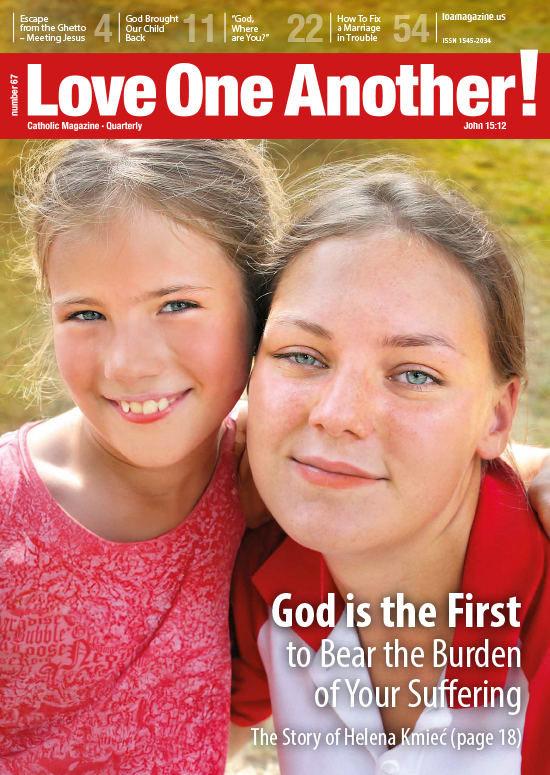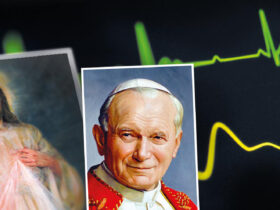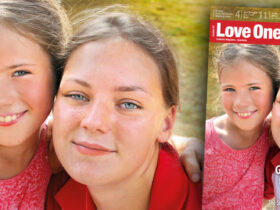Love is the Gift of Self

Each of us longs to love and to be loved. This is set so deeply into our hearts that the fulfilment of all our dreams will seem empty if we have no one with whom to share them.
People achieve self-fulfilment best through love. This means that each man becomes completely whole when he learns how to truly love. But what is true love? How do we recognize it? How do we apply it in our life?
The Constitution on the Church in the Modern World, Gaudium et Spes, of the Second Vatican Council, expresses that “Love is the selfless giving of the self.” This sounds lovely and lofty but putting this idea into practice in our lives is extremely difficult.
The Stages of the Growth of Love
• You are for me (falling in love) – at this stage of the relationship the intensity of my feelings is overwhelming. This stage is often accompanied by conflicting feelings of jealousy, selfishness, delight and euphoria as well as the inclination to withdraw from my social groups, submit myself to the other, pretence and egoism.
• You and I are meant for each other (working on the relationship) – this is the stage when I want to share everything with the other, be part of her life, help her and listen to her, and demand the same treatment from her. This is accompanied by openness, trust, attachment, selflessness, and high expectations, but this is combined with frustration when reality does not live up to our expectations
• I am for you (love) – the highest stage of the development of love: I give you my 100%, I want to be close to you, to be with you, and provide you with the conditions for self-improvement. I will completely accept whatever you give me, I will not force you to change but will encourage you to become a better person. This is accompanied by friendship, trust, joy, the feeling of contentment and fulfilment. This stage can be achieved by people who are mature, self-confident, and completely committed to each other.
Falling in Love
Love is often mistaken for the process of falling in love, which is part of love but only in the initial phase. Falling in love is a state intensely tied to biological-chemical reactions of the body. The neurotransmitters and hormones that are stimulated in this stage intensify emotions, particularly feelings of pleasure. These substances affect our brain in a similar way to the taking of drugs, leading to a state of euphoria and excitement, just by thinking of the object of our affections. This makes us want to be close to the person we are in love with. We want this to last forever, we do not want these feelings to disappear. People in this stage often say, “I am in love with her.” This perfectly reflects the state of being in love, whilst putting his own person first, and, therefore, we can say he is loving himself in the other person. In other words, the object of affection is my own self. This also means that at this stage, this is not mature love.
The passion that is the main ingredient of falling in love usually lasts about two years. If closeness and commitment have not been achieved at this point, then the relationship falls apart. People who attribute love to this phase of intense emotions and sensations often end up separated or divorced after a few years. Couples like these go to counselling deeply disappointed and blame each other for the failure of their relationship.
Towards Love
Jacek Pulikowski, a family counsellor, emphasizes the importance of couples building their life together on a solid foundation. This type of foundation is built on values such as: openness to life, willingness for self-improvement, and understanding what true love is, which for Christians means primarily faith in Jesus Christ.
We tend to think that the opposite of love is hate, loneliness, lack of trust, falsehood. Meanwhile, the opposite of love in fact is egoism (the love of self, or selfishness). If one is an egoist, one cannot truly love. Love is the most exceptional attitude one person can have towards another. Love gives one a sense of contentment and fulfilment in one’s life. Love is an unbreakable bond which also gives freedom; we become fully ourselves in our relationship with our beloved. Love demands the choice to be with someone, both in good times or in bad times. Love demands commitment, intimacy, friendship, passion and tenderness.
Marital love also involves the unity of the two spouses: their bodies become one and their souls merge into each other. The love between a man and a woman becomes complete only in marriage, when both are certain that the effort they have put into the relationship will not be wasted. Marriage gives them the sense of stability and security, which is expressed in the affection that they show for each other. They hold the position that, “I give you everything that I have, forever and faithfully; I will work on myself for us, because you are the one with whom I want to spend the rest of my life.” We must act this way so that we will enjoy being with each other and be each other’s best friends. We must build the bond that will hold our relationship together.
How to Build and Strengthen Our Bonds
• Time – each bond demands that we do things together, for instance: going out for walks, drinking tea, working in the garden on a sunny day, doing sports, reading books, long conversations about ordinary things that we enjoy.
• Help – small gestures in everyday life: making coffee in the morning, doing the dishes, staying at home sometimes with the kids so that your spouse can focus on her hobbies, while remembering to prioritize family time.
• Say ‘Sorry’ – learning how to say sorry strengthens our marital bonds. Apologising frees us to be ourselves, teaches us humility, and allows us to avoid marital traps, such as sulking, taking offense, and using the silent treatment.
• Praise – in a loving marriage there ought to be twenty positive comments, which includes the golden words ‘thank you’, to one negative. Praising each other and saying out loud the things that are good in our beloved will make the couple feel good about being with each other.
• Touch – a good hug should last at least about 20 seconds; it stimulates the release of the bonding hormone oxytocin in our body, relieves stress and teaches couples to know that they can show affection to each other even when sex is not involved.
• The Language of Love – it is worth learning to speak one of the five languages of love that would work on our beloved (expression of affirmation, quality time, accepting gifts, small gestures of support, a loving touch). What one person considers an expression of love may not be the same as someone else. I recommend Gary Chapman’s 5 Love Languages.
• Sense of Humor – in difficult moments a sense of humor helps release tension and becomes a way to look at a situation from a distance. In our day-to-day lives, laughter builds joy.
• Joint Prayer – this is a time when we open our souls to God and to each other; it is a time when we develop resistance to temptation.
What is True Love?
It is worth considering what love is not. In his conferences, Father Marek Dziewiecki discusses several myths about love.
• Love is not the same as having sex. If this was true, prostitutes would be the most loving people in the world. Sex is an expression of love, and has a very important part in marriage, but it is only one part.
• Love is not the same as acceptance. Love is considerably greater. To accept someone is to agree that he is what he is and that he does not change. Love, however, assumes that the loved one improves little by little. If I accept you as you are but I do not love you, I have no right to criticize you or to ask that you give up certain things for your good or for the common good. Love requires truthfulness. It assumes that we tell each other the truth, with complete care for the good of the other. Marriage reveals our biggest faults and the areas in our life that we are not particularly proud of. And that is how it should be! This is what marriage is for – so that everything is revealed in the light of day and becomes an opportunity for improvement. In this way we become more loving people.
• Love is not destiny, it requires our actions and decisions on things that we have real influence over. Love requires effort, continuously being aware of the needs of the other and the state of our relationship. It requires that we give completely of ourselves in whatever way that we are able.
• Love does not destroy the loving person, if we attempt to openly and sincerely give ourselves to our beloved, but if the husband, for example, does not work on himself, drinks too much, manipulates me, forces his opinions on me, then we will need the help of a specialist.
• Love is best defined in the marriage vows. Our vows require fidelity to our decision, that our promise is sincerely and consequently kept and carried out. This is why marriage is a safe and friendly space for development.
Love can grow if both spouses show an attitude of respect towards each other, are ready to make the effort, are willing to make compromises and have constructive discussions, and desire the good of the other.






